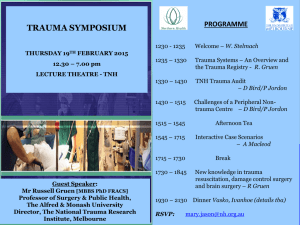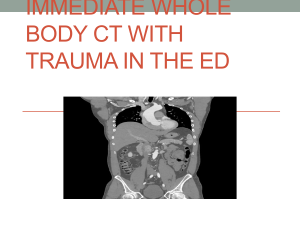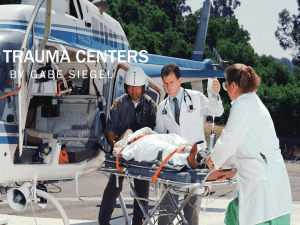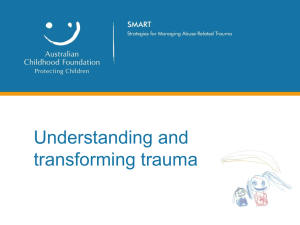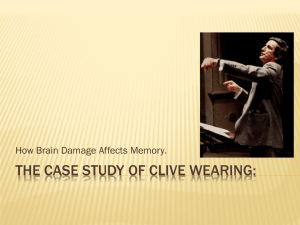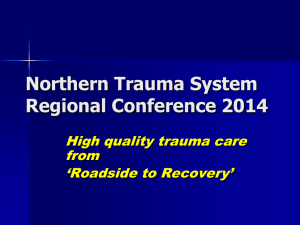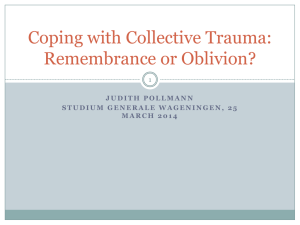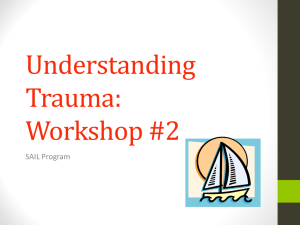Intro to rehab workshop
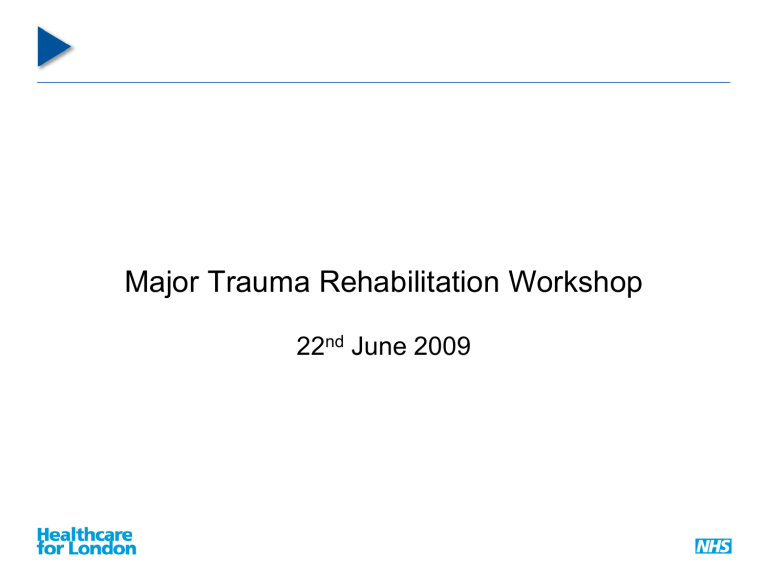
Major Trauma Rehabilitation Workshop
22 nd June 2009
Agenda - Morning
9.30 Welcome & objectives for the day
9.40 London Trauma System: Context and progress to date
10.00
Current evidence on outcomes
10.15
Major Trauma Rehabilitation Workstream: summarising the key themes
10.45 Q&A
11.00
Refreshments
11.30 Explanation of break out groups
11.45
Break out groups
12.45
Lunch
Agenda - afternoon
13.30 Break out groups (second session)
14.40 Refreshments
15.10 Feedback from facilitators
15.40 Voting on priorities
16.00 Next Steps
16.30 Close
Objectives for the day
By the end of today you will have:-
• A common understanding of Rehabilitation
Workstream and your contribution to it
• Had an opportunity to imprint your expertise, knowledge and experience into the this work
London Trauma System: context and progress to date
Tracy Parr
Network Development Manager
Major Trauma Project
Jane Barnacle
Rehab Workstream Lead
Major Trauma Project
What is major trauma?
• Major trauma – a limb amputation, severe gunshot or knife wounds, a spinal injury, open skull fracture, paralysis or multiple injuries e.g. a road traffic accident.
Injury severity score greater than 15
• Trauma – fractured neck of femur, broken ankle, minor head injury
The scale of the problem
• Around 1,660 major trauma cases per year
• About one case a week for most A&Es
• Most major trauma cases occur in central London
The case for change
• Current death rates are 40% higher in the UK than in parts of the US where there are effective trauma systems
• Two thirds of major trauma patients taken to a local hospital end up being transferred
• Royal London has 28% less deaths from major trauma compared with national average
What a good major trauma service looks like
New specialist centres of care which have:
• sufficient volumes of patients for clinicians to become skilled
• are open 24/7, and
• provide a complete range of specialist major trauma care to a defined high standard
Staff involved in Major Trauma
Speech & Language Therapists Renal physicians
ENT surgeons
Porters
Ophthalmologists
Urologists
Maxillofacial Surgeons
Haematologists
Trained ambulance personnel
Resident Major Trauma team
Pharmacists
Cardiothoracic Surgeons
A & E Team
Endocrinologists
Physiotherapists
General Surgeons
Occupational Therapists
Vascular Surgeons
Intensive Care Team
Cardiologists
Transplant Co-ordinators
Radiologists
Specialist Nurses
Dieticians
Laboratory Staff
Anaesthetists
Cleaners
Orthopaedic Surgeons Psychiatrists
Neurosurgeons
Rehabilitation Physicians
Geriatricians
Data Collectors
Theatre Staff
Social Workers
Establishing a Trauma System
Non-
London
Rehab
Rehab
Network
Director
Trauma
Centre
Rehab
Rehab
Rehab
Rehab
Special.
Rehab
London
Director
Rehab
Network
Director
Trauma
Centre
Rehab
Rehab
Pre-Hospital Triage Protocol
What a good trauma network looks like
• Three or four networks with a major trauma centre leading and co-ordinating the service and clear transfer agreements
• Local trauma centres in all
A&Es would improve, so thousands of patients would have better care
• Ability to cope with a major disaster
HfL Major Trauma Project Structure
The governance arrangements for the Major Trauma project within the overall HfL Programme is illustrated below:
Patient / Public
Advisory Group
London Commissioning
Group
Clinical Advisory
Group
HfL Programme
Executive Group
Major Trauma
Project
Board
Major Trauma Clinical
Expert Panel
Accountable
Reporting
Advising
Major Trauma
Project
Team
Currently
• JCPCT has run a Public Consultation on various options
– Public responses
– Organisational responses (e.g. Royal Colleges, Charities)
– Equality Impact Assessment
• Joint Health Overview and Scrutiny Committee
Four networks – JCPCT preferred option
Four network - alternative option
Three network option
Next steps
• Decision potentially 20 July
• Commissioning
• London Trauma Office
• London Trauma Director appointed
CPD Project
Possible structure
Project Lead 8b
Senior Clinical Advisor
8a
Clinical Advisor
7
Senior Clinical Advisor
8a
Clinical Advisor/
Project officer 7
Stroke
•Needs assessment
•Leadership programme
•Development of core syllabus
•Commissioning
•Standardised competency framework
Major Trauma
•Indicators/outcomes/standards
•Development of a core syllabus
•Standardised competency framework
•Learning culture
•AHP role development
